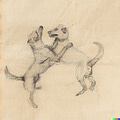Howdy,
Thanks for the feedback on the new newsletter format last week. You all shared two consistent pieces of advice:
Inject more of your voice.
Elaborate more in the “tying it all together” section.
Well, be careful what you wish for. I’ve incorporated both suggestions into today’s email.
Enjoy!
An idea from ethology
Ethology is the study of animal behavior.
One of the most puzzling animal behaviors is play. Playing seems like a leisurely activity with no evolutionary purpose, so why do so many of our fellow mammals do it?
Fear not, the nerds are on it. It turns out play might be more about survival than leisure. From Scientific American:
“Play behaviors evolved as ritualized forms of survival skills needed later in life, providing the opportunity to perfect those skills.”
This made me think of how my dog plays. He’s growling. He tackles and nips at his play partner. He’s slightly scaring everyone around him. But he’s usually not trying to hurt the other dog. (Usually.)
“Engaging in play allows animals to experiment with new behaviors in a protected environment without dangerous consequences.”
That makes sense. But what great battle is my dog preparing for when he chews through a door frame? Science may never know.
An idea from Michael Jordan
Michael Jordan was famous for once saying he'd rather miss a game than miss practice. He was famous for other things, too, but let’s not be pedantic.
On the virtues of practice, he once elaborated:
“I practice as if i'm playing in the game, so when the moment comes in the game it's not new to me. When you get to that moment, you don't have to think. Instinctively, things happen.”
That might be super obvious or whatever, but it really clicked for me. He practiced so that when the stakes were high, his immediate reactions were the correct ones.
An idea from Benjamin Franklin
When Benjamin Franklin died, he was one of the most famous writers in America. But he didn’t start life as a writing wonder child. His own father once roasted him, telling the young Benjamin that he lacked the “elegance of expression.”
So America’s future co-founder did something so tedious that I suspect few of us would have the patience to do the same.
He picked up a copy of The Spectator, jotted some notes on what each article was about, and then re-wrote the articles from scratch himself. He elaborated on the process in his autobiography:
“Then I compared my Spectator with the original, discovered some of my faults, and corrected them.”
“This was to teach me method in the arrangement of thoughts. By comparing my work afterwards with the original, I discovered many faults and amended them.”
He repeated this until his articles read as elegantly as The Spectator. Occasionally, he’d even make small improvements to their work. His effortless writing style was forged through a process that was anything but.
Tying it together
Without practice, the only chance we have to hone our skills is when the stakes are the highest. That’s a bad time to learn!
Instead, every discipline offers its own ways to train. Maybe it looks tedious, like doing copywork. Maybe it’s more intense than the real thing, like how Michael Jordan practiced. Or maybe it looks like play.
Whatever shape it takes, practice yields the same result: we build stronger instincts we can take with us into the arena.
—
Sources: Scientific American, a YouTube video of Michael Jordan, and The Autobiography of Benjamin Franklin.
—
See you next week,
Stew


I really enjoyed reading this Letter Stew, thanks for tying these ideas together. I know something else you are exploring deeply is the notion of being a generalist/having range and so I wonder how you are thinking about these ideas of practice in the capacity of being a generalist?
Asking for myself!